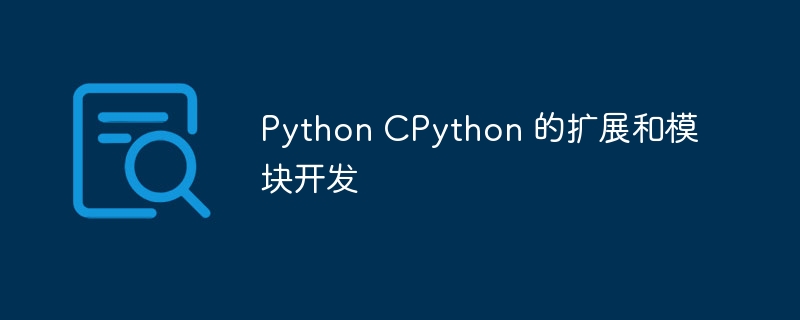Python CPython extension and module development

python CPython Extension module Development
CPython extension
Extensions are binary codes written in C language designed to extend the core functionality of Python. They allow developers to access underlying system resources, perform complex calculations or integrate external libraries. Developing an extension involves creating CPython api compliant code and compiling it into a dynamic link library (.dll) or shared object (.so) file.
CPython module
A module is a set of related functions, classes, and variables written in Python. They provide a structured way to organize and encapsulate code and allow developers to create reusable components. Modules can be distributed as Python files (.py) or compiled bytecode files (.pyc).
Extension and module development steps
Developing a CPython extension or module involves the following steps:
- Planning: Determine the purpose and functionality of the extension or module.
- Implementation: Use C (extension) or Python (module) to implement the code.
- Compilation: Compile the C extension using an appropriate compiler (e.g. GCc, clang).
- Installation: Install compiled extensions or modules into the Python interpreter.
- Import: Import and use extensions or modules in Python code.
Sample code:
CPython extension (hello.c):
#include <Python.h>
static PyObject* hello_world(PyObject* self, PyObject* args) {
return Py_BuildValue("s", "Hello, world!");
}
static PyMethodDef HelloMethods[] = {
{"hello_world", hello_world, METH_NOARGS, "Print "Hello, world!""},
{NULL, NULL, 0, NULL}
};
PyMODINIT_FUNC PyInit_hello(void) {
return PyModule_Create(&PyModuleDef_HEAD_INIT, "hello", "A simple CPython extension", -1, HelloMethods);
}CPython module (hello.py):
def hello_world(): return "Hello, world!"
Installation and use:
# 编译扩展 gcc -shared -o hello.so hello.c # 安装扩展 pip install hello.so # 导入模块 import hello # 使用扩展/模块 print(hello.hello_world())
in conclusion
Extension and module development are important ways to extend the functionality of Python CPython. Extensions provide access to underlying system resources, while modules allow code reuse and organization. By following the steps outlined in this article, developers can create their own extensions and modules that significantly increase the scope and functionality of their Python applications.
The above is the detailed content of Python CPython extension and module development. For more information, please follow other related articles on the PHP Chinese website!

Hot AI Tools

Undresser.AI Undress
AI-powered app for creating realistic nude photos

AI Clothes Remover
Online AI tool for removing clothes from photos.

Undress AI Tool
Undress images for free

Clothoff.io
AI clothes remover

AI Hentai Generator
Generate AI Hentai for free.

Hot Article

Hot Tools

Notepad++7.3.1
Easy-to-use and free code editor

SublimeText3 Chinese version
Chinese version, very easy to use

Zend Studio 13.0.1
Powerful PHP integrated development environment

Dreamweaver CS6
Visual web development tools

SublimeText3 Mac version
God-level code editing software (SublimeText3)

Hot Topics
 1377
1377
 52
52
 How to solve the permissions problem encountered when viewing Python version in Linux terminal?
Apr 01, 2025 pm 05:09 PM
How to solve the permissions problem encountered when viewing Python version in Linux terminal?
Apr 01, 2025 pm 05:09 PM
Solution to permission issues when viewing Python version in Linux terminal When you try to view Python version in Linux terminal, enter python...
 How to efficiently copy the entire column of one DataFrame into another DataFrame with different structures in Python?
Apr 01, 2025 pm 11:15 PM
How to efficiently copy the entire column of one DataFrame into another DataFrame with different structures in Python?
Apr 01, 2025 pm 11:15 PM
When using Python's pandas library, how to copy whole columns between two DataFrames with different structures is a common problem. Suppose we have two Dats...
 How to teach computer novice programming basics in project and problem-driven methods within 10 hours?
Apr 02, 2025 am 07:18 AM
How to teach computer novice programming basics in project and problem-driven methods within 10 hours?
Apr 02, 2025 am 07:18 AM
How to teach computer novice programming basics within 10 hours? If you only have 10 hours to teach computer novice some programming knowledge, what would you choose to teach...
 How does Uvicorn continuously listen for HTTP requests without serving_forever()?
Apr 01, 2025 pm 10:51 PM
How does Uvicorn continuously listen for HTTP requests without serving_forever()?
Apr 01, 2025 pm 10:51 PM
How does Uvicorn continuously listen for HTTP requests? Uvicorn is a lightweight web server based on ASGI. One of its core functions is to listen for HTTP requests and proceed...
 How to dynamically create an object through a string and call its methods in Python?
Apr 01, 2025 pm 11:18 PM
How to dynamically create an object through a string and call its methods in Python?
Apr 01, 2025 pm 11:18 PM
In Python, how to dynamically create an object through a string and call its methods? This is a common programming requirement, especially if it needs to be configured or run...
 What are some popular Python libraries and their uses?
Mar 21, 2025 pm 06:46 PM
What are some popular Python libraries and their uses?
Mar 21, 2025 pm 06:46 PM
The article discusses popular Python libraries like NumPy, Pandas, Matplotlib, Scikit-learn, TensorFlow, Django, Flask, and Requests, detailing their uses in scientific computing, data analysis, visualization, machine learning, web development, and H
 How to handle comma-separated list query parameters in FastAPI?
Apr 02, 2025 am 06:51 AM
How to handle comma-separated list query parameters in FastAPI?
Apr 02, 2025 am 06:51 AM
Fastapi ...
 How to solve permission issues when using python --version command in Linux terminal?
Apr 02, 2025 am 06:36 AM
How to solve permission issues when using python --version command in Linux terminal?
Apr 02, 2025 am 06:36 AM
Using python in Linux terminal...




